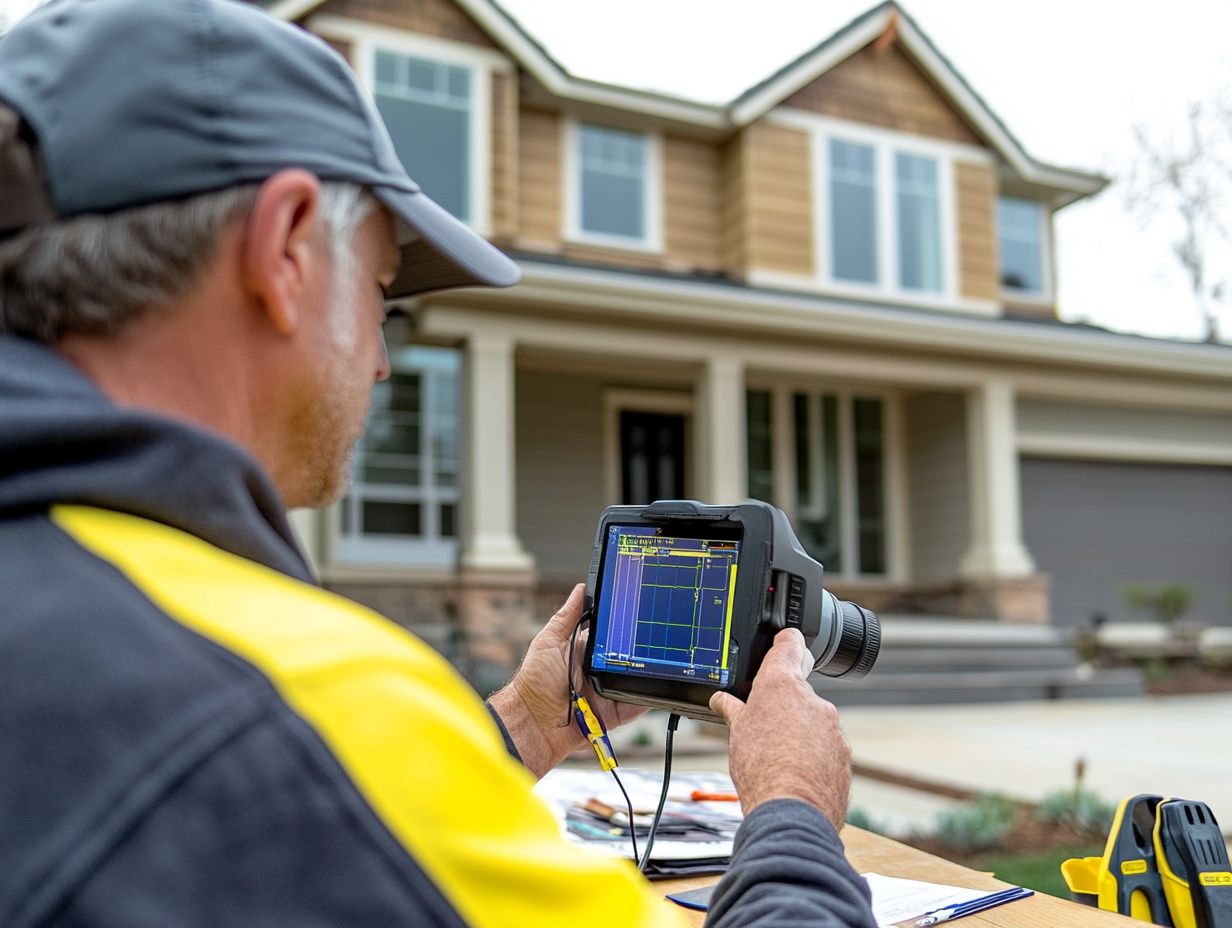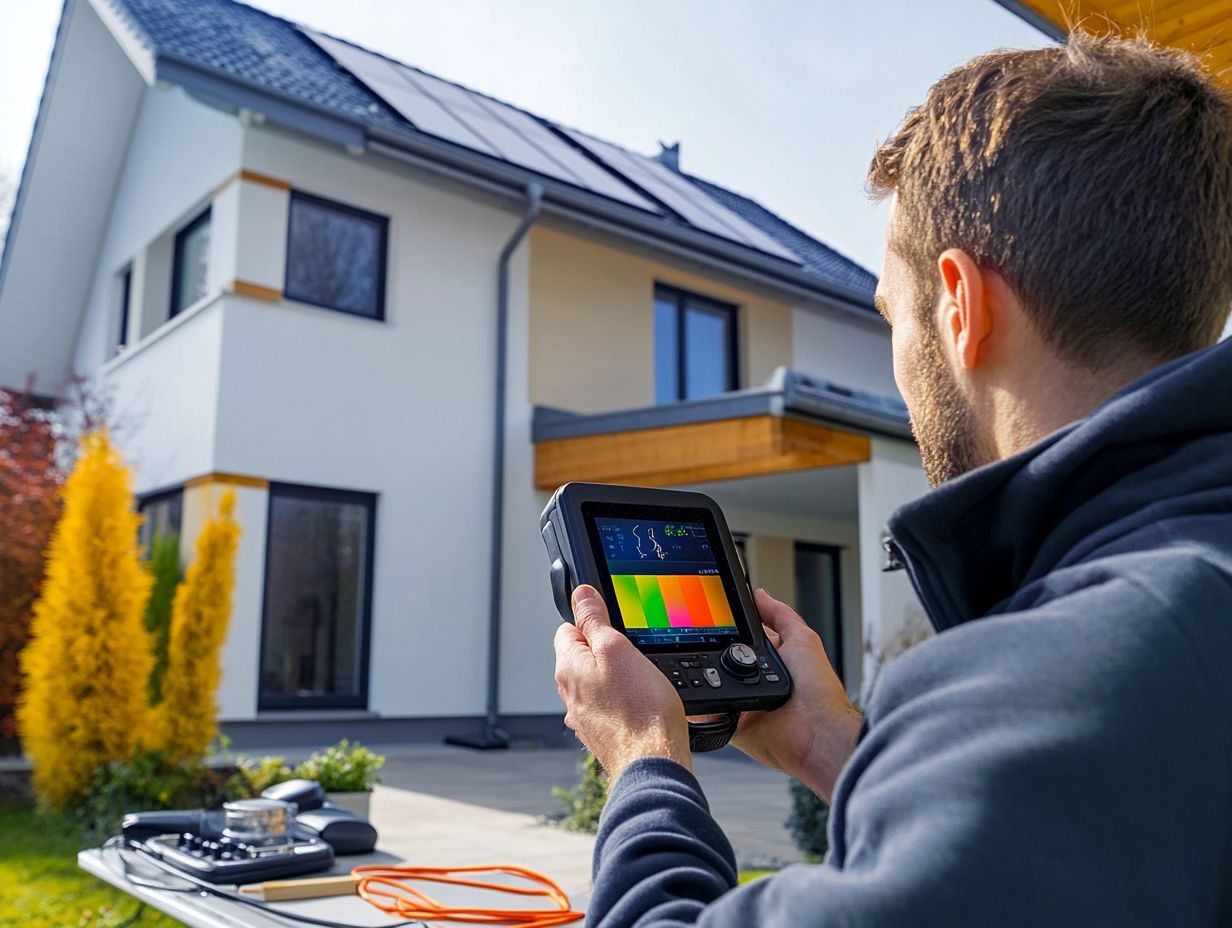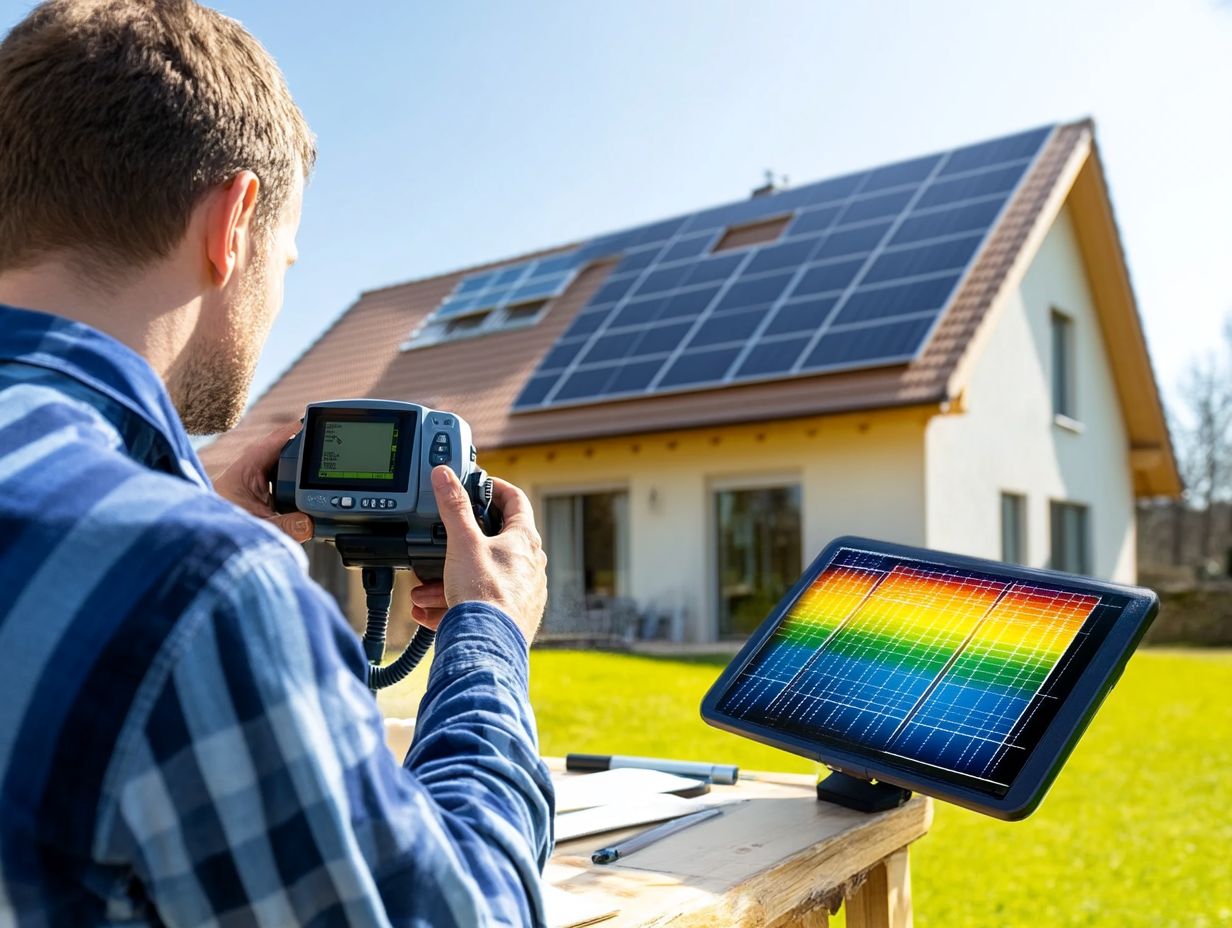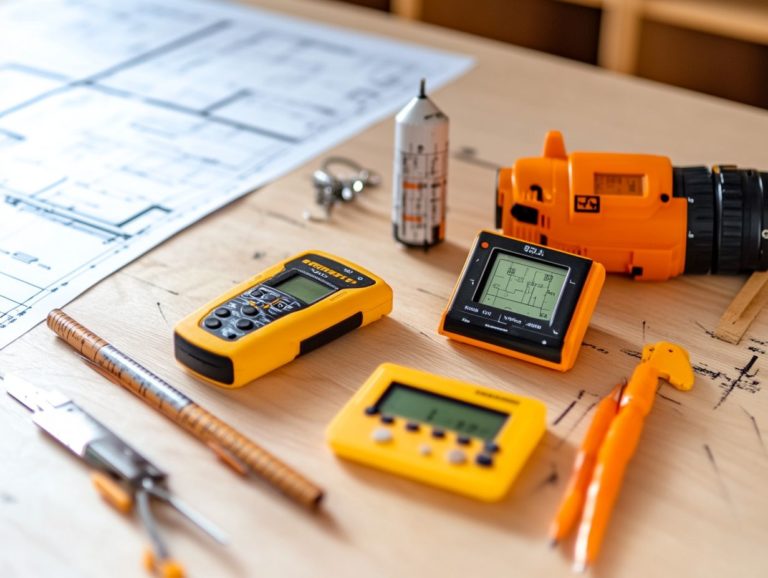The Complete Guide to Home Energy Assessments
Are you striving to lower your energy bills and enhance the efficiency of your home?
A home energy assessment could be precisely what you need! This comprehensive guide will navigate you through every aspect of home energy assessments from understanding their purpose and benefits to preparing for one and interpreting the results.
You’ll also uncover DIY options and valuable tips for selecting a qualified professional auditor. Prepare to unlock the potential for savings and increased comfort in your living space!
Contents
Key Takeaways:

- A home energy assessment evaluates the energy efficiency of your home.
- It can save you money on energy bills and improve your comfort.
- Preparing for an assessment involves making your home more energy efficient.
What is a Home Energy Assessment?
A home energy assessment is a thorough evaluation of a residential property designed to uncover its energy performance and efficiency levels. Conducted by a certified professional auditor, this assessment uses tools like infrared cameras to find energy-saving opportunities.
These insights can lead to lower energy costs and improved indoor air quality for families, whether they live in bustling New York, vibrant Austin, or picturesque Denver.
Definition and Purpose
This essential process identifies areas needing improvement through various assessment tools and methods. It allows you to uncover inefficiencies in your energy consumption while enhancing your indoor air quality by addressing factors such as ventilation, insulation, and moisture control.
By using specialized tools, professionals can accurately find energy leaks and assess overall system performance. The insights gained from these assessments guide you toward effective upgrades that promote sustainable practices and lower your utility bills, contributing to a healthier living environment!
Why Get a Home Energy Assessment?
Obtaining a home energy assessment is essential, offering advantages that extend beyond energy bill savings. This assessment enhances your energy efficiency and profoundly influences your household’s energy consumption.
By identifying energy-saving opportunities, you can make informed decisions about upgrading your HVAC systems and investing in energy-efficient appliances. You may also qualify for rebates or incentives from utility companies, amplifying the benefits!
Benefits and Cost Savings
The benefits of a home energy assessment go beyond immediate cost savings; they include enhanced energy management and the identification of energy-efficient appliances that elevate your home’s comfort.
You can expect to see significant reductions in your utility bills averaging around 20% by implementing the recommendations from your assessment. Investing in Energy Star-rated appliances lowers your energy consumption and may qualify you for rebates from local utility companies.
By sealing gaps around your windows and doors, you’ll improve insulation, potentially saving hundreds on heating and cooling expenses throughout the year. With assessments typically costing between $100 and $500, you ll likely recoup this investment within just a few months through your savings. It s a savvy financial choice that also champions environmental sustainability!
How to Prepare for a Home Energy Assessment

Preparing for a home energy assessment requires a few thoughtful steps to ensure a thorough evaluation of your home’s energy performance.
Start by collecting essential documentation, including your past energy bills. Check your insulation and look for air leaks, as these factors can greatly impact the outcome of the assessment.
Act quickly to reap the benefits of a comprehensive evaluation!
Steps to Take Before the Assessment
Before your Home Energy Assessment, it s essential to take a few specific steps. Start by gathering relevant documentation, such as your energy bills and details about your heating and cooling systems. This preparation makes a big difference!
Besides collecting these documents, take a moment to inspect your living space for any visible issues. Look for drafts around windows or doors and check for insulation problems in your attic or basement.
It s also a good idea to jot down notes regarding how frequently you use your heating and cooling systems, as well as any discomfort you might experience in certain rooms. This information will provide valuable context for your assessor.
Reviewing past energy usage trends can be enlightening, revealing spikes that may need further investigation. By taking these proactive measures, you not only streamline the assessment process but also pave the way for actionable recommendations that can significantly enhance your overall energy efficiency.
What to Expect During a Home Energy Assessment
During a Home Energy Assessment, you can anticipate a thorough inspection and analysis process that examines multiple facets of energy usage and air quality in your home. The professional auditor will assess insulation levels, heating and cooling systems, and the effectiveness of energy-efficient fixtures.
Utilizing advanced techniques, they will identify areas for enhancement and uncover energy-saving opportunities.
Inspection and Analysis Process
The inspection and analysis process during a Home Energy Assessment entails a meticulous examination of your energy use patterns and indoor air quality. Techniques like thermal imaging a method that uses heat detection to find energy leaks are employed to uncover inefficiencies lurking in the shadows of your home.
The blower door test is another critical method that assesses your home’s airtightness by creating a pressure difference. This allows you to pinpoint those pesky leaks that undermine your energy efficiency.
Energy auditors often utilize tools such as humidity meters and duct testers to evaluate heating and cooling systems and their overall impact on energy consumption.
By integrating these various approaches, you gain a comprehensive understanding of where energy is being wasted and how you can make adjustments to enhance performance. This thorough analysis not only highlights areas that need improvement but also promotes a healthier indoor environment, making it an essential step in optimizing your home’s energy profile.
Interpreting and Acting on Results
Interpreting and acting on the results of a Home Energy Assessment is crucial for you as a homeowner. It gives you the power to understand your energy usage and make informed decisions based on the tailored recommendations provided.
This evaluation will illuminate key areas of concern, such as elevated energy costs, potential air pollutants, and opportunities to integrate clean energy solutions like heat pumps and solar panels into your home.
Understanding Your Energy Usage and Recommendations

Understanding your energy usage and the insights from a Home Energy Assessment is crucial for implementing effective changes that enhance both energy efficiency and indoor air quality.
By thoroughly analyzing your energy data, you can pinpoint patterns and identify areas of excessive consumption, paving the way for targeted interventions.
Embracing practical recommendations like upgrading insulation, sealing leaks, and investing in energy-efficient appliances can lead to significantly lower utility bills while boosting your comfort levels.
Adopting a holistic approach to energy management not only supports your financial savings but also enhances air quality, contributing to a healthier living environment.
Engaging with local energy services or leveraging smart technology can further simplify monitoring, ensuring that you can make ongoing adjustments for sustained benefits over time.
DIY Home Energy Assessments
Embarking on a DIY Home Energy Assessment gives you the power to actively engage with your home s energy efficiency and indoor air quality.
By employing straightforward tools and techniques, you can assess the effectiveness of your insulation, uncover air leaks, and pinpoint energy-saving opportunities all without the need for a professional auditor.
This hands-on approach not only enhances your understanding but also places you firmly in control of your home’s energy performance.
Start your DIY assessment today and unlock the potential for savings!
Tools and Techniques for Self-Assessment
Utilizing specific tools and techniques for self-assessment enables you to effectively gauge your home’s energy efficiency and identify areas, such as air leaks, that require attention.
By implementing methods like thermal imaging cameras, energy monitoring devices, and straightforward DIY blower door tests, you can uncover valuable insights into your property’s performance.
These tools not only spotlight deficiencies but also empower you to take corrective actions, resulting in substantial savings on your energy bills.
Infrared thermometers can reveal temperature discrepancies that indicate drafts or insulation issues. Meanwhile, smart thermostats track usage patterns to optimize your heating or cooling settings.
Together, these resources form a comprehensive picture of your energy consumption, providing you with enhanced comfort and sustainability in your home.
Choosing a Professional Home Energy Auditor
Selecting a qualified professional home energy auditor is crucial for obtaining a thorough assessment. Several key factors should guide your decision.
Consider checking their credentials from reputable organizations like the Building Performance Institute. It’s wise to inquire about their experience with programs such as the Comfort Home Pilot Program to ensure you receive dependable results.
Factors to Consider and Questions to Ask
When selecting a professional home energy auditor, check important factors like the auditor’s certifications, experience, and specific questions that can clarify the assessment process.
It’s essential to verify the auditor’s qualifications and any affiliations with recognized organizations in the energy sector. Asking about the tools and methods used in the evaluation can illuminate the thoroughness of the audit.
Inquiring about past projects and client testimonials will provide valuable insights into the auditor’s reliability and effectiveness.
You may want to know how the audit will not only identify energy inefficiencies but also suggest actionable solutions that could lead to significant savings over time.
Knowing the audit’s report format helps you prepare for the results you’ll receive after the assessment.
Frequently Asked Questions

What is a home energy assessment?
A home energy assessment is a thorough evaluation of a home’s energy use and efficiency. It involves inspecting all aspects of the home, from insulation and windows to appliances and heating/cooling systems, to identify areas where energy efficiency can be improved.
Why should I get a home energy assessment?
Getting a home energy assessment can help you save money on your energy bills, improve the comfort and air quality in your home, and reduce your carbon footprint. It can also help you identify potential health and safety hazards, such as gas leaks or electrical issues.
Who can perform a home energy assessment?
A home energy assessment should be performed by a certified energy auditor or a home energy assessor. These professionals have the necessary training and knowledge to properly evaluate your home’s energy use and make recommendations for improvement.
What happens during a home energy assessment?
During a home energy assessment, the auditor will conduct a visual inspection of your home’s exterior and interior, including all living spaces and the attic. They will also collect data on your energy usage and perform various tests, such as a blower door test a test that checks how well your home is sealed from air leaks and a thermal imaging scan, which shows temperature differences in your home, to identify areas of energy loss.
How long does a home energy assessment take?
The length of a home energy assessment can vary depending on the size and complexity of your home, but it typically takes between 2-4 hours to complete. The auditor may need to schedule a follow-up visit to complete any necessary tests or to gather additional information.
What can I expect after a home energy assessment?
After a home energy assessment, you will receive a detailed report outlining the auditor’s findings and recommendations for improving your home’s energy efficiency. This may include suggestions for upgrades, such as adding insulation or upgrading to energy-efficient appliances, as well as information on potential cost savings and available rebates or incentives.
Don’t miss out on savings! Schedule your home energy assessment today for immediate benefits!






